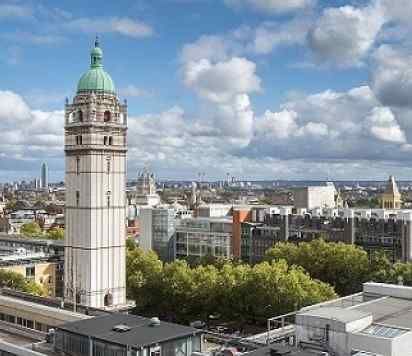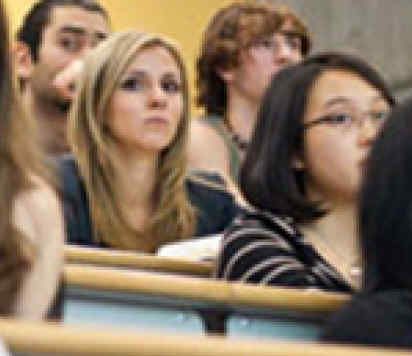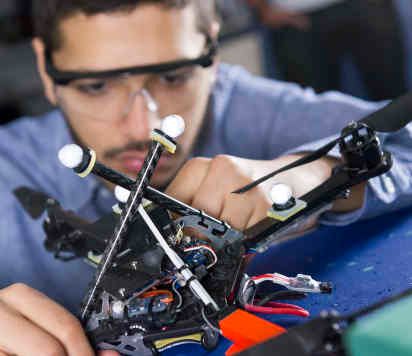As an engineer, you will be constantly involved in various projects and problems. Our programmes also feature a plethora of projects that are interesting and allow students to explore further and apply what was learnt in the classroom.
Projects within our Undergraduate Programmes
What is a UROP?
The Undergraduate Research Opportunities Programme (UROP) is where students can participate in projects and develop an appreciation of research and its environment. Students can take a wonderful opportunity to be involved in internal research projects under the supervision of academic staff.
You may read more about UROP and how to get involved through the dedicated pages set out by the College.
Hear from a Student's Perspective
Our fellow undergraduate Nnaemeka talks about his UROP in 2020, working with the 10x5 Wind Tunnel Team on a COVID-19 research project:
Nnaemeka Anyamele
What is GDP?
The Group Design Project (GDP) is an intensive 5-week highlight design project where the cohort is split into different design teams. Each team has to develop a particular design concept to the stage where the feasibility has been fully explored. Through this project, the design groups will be exposed to many aspects of the design process and thinking and be able to formulate creative and exciting solutions that address the overall objectives.
For those undertaking H415 (Aeronautics with Spacecraft Engineering) programme, they will have to undertake a space-related design project.
What does it involve?

Each project team has approximately 25-30 students. Within the team, students are broken up into smaller subteams, each is responsible for a part of the design. Each member plays a slightly different role to ensure the success of the design project. This simulates working in an engineering firm whereby the team at large works towards delivering a product and smaller subteams are responsible for specific aspects of the design. For example, to design a deep space probe, such as European Space Agency's (ESA) Solar Orbiter, there are teams that are responsible for a subsystem of the spacecraft (i.e. a propulsion team, an attitude and orbit control system team, a structures and mechanisms team, etc).
The multi-disciplinary interconnected nature of Aeronautics requires working within and between each subteam to make suitable compromises such that an overall design is feasible and practical. The image on the right is a caricature of the resulting aircraft design if concessions are not made between each design group. Students are also highly encouraged to explore innovative ideas and solutions to tackle the problems encountered.
At the end of the project, students will present their designs to a panel and produce a technical report.
Previous Projects
Past projects that were completed in GDP include:
- "Flying wing" passenger aircraft
- Advanced tactical stealth fighter
- Manned mission to Mars
- Electric racing car for a regional competition
- Hydrogen-powered aircraft
- Autonomous nano-drone delivery system
You may view some of the presentation videos from past GDPs here.
Hear a Student's Perspective of the GDP
Tejasva
What is the FYP?
The Final Year Project (FYP) is an individual research project that includes some elements of originality and builds on existing scientific research. It contributes significantly to the final degree award and requires continuous activity.
The FYP provides students with an opportunity to immerse themselves in a scientific problem and gives them a flavour of what research is.
Is there supervision?
Each student has a project supervisor. For internal projects, this would be an academic within the department. External projects can be completed either at another university or with an industrial partner. For external industry projects, the supervisor will be an employee of the company.
How much guidance is there?
The project provides an avenue for independent student-led research and self-directed learning. This provides students with the freedom to take the research into an area that is of interest. The supervisors provide guidance and support to enable the student to achieve their goals.
Is it limited to a list of projects?
No. Students are welcome to approach academics within the department, academics in another institution or contact industrial partners to propose a topic.
What do students get out of this experience?
The FYP is a culmination of the degree. It requires consolidating technical knowledge gained and developing one's professional skills, such as communication and problem solving. Communication is vital in ensuring the work and research produced is understood by others. As several challenges may come up during the course of the project, it requires: perseverance; originality of thought; and the ability to teach oneself how to think through and troubleshoot a problem.
Taking the FYP further
Many graduates have proceeded to pursue a PhD in the field of their FYP.







